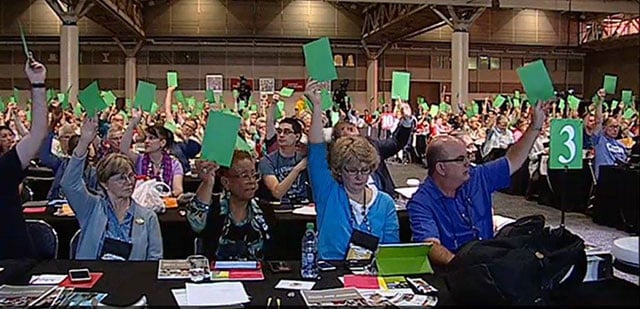
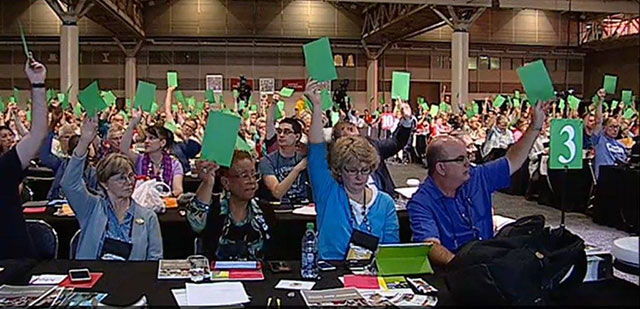 Participants in the 14th triennial Churchwide Assembly of the Evangelical Lutheran Church of America (ELCA) raise green cards in the air to signal their support for a measure to steer their church away from investing in the Israeli occupation of Palestine. (Photo: ELCA)
Participants in the 14th triennial Churchwide Assembly of the Evangelical Lutheran Church of America (ELCA) raise green cards in the air to signal their support for a measure to steer their church away from investing in the Israeli occupation of Palestine. (Photo: ELCA)
There were plenty of unoccupied folding chairs inside the New Orleans Convention Center’s cavernous meeting hall this past Saturday, August 13, but Jo Ann Wacker-Farrand just couldn’t sit down.
“I’ve got no saliva in my mouth,” she said as she brushed past me in her khaki capris. She was not the only one pacing anxiously near where I sat in the back of the hall, with the other visitors and non-voting members at the 14th triennial assembly of the Evangelical Lutheran Church of America (ELCA). A few moments earlier, the assembly chair had officially called a close to the debate over “Memorial C2,” an initiative within the church to avoid investing in the Israeli occupation of Palestine.
“Memorial C2 talks about developing a human rights screen for investments,” Wacker-Farrand had explained to me earlier. She, along with a small group of other Lutherans from across the country calling themselves Isaiah 58, has been organizing for months to bring this “Memorial” into consideration before the entire voting body of the ELCA (the largest and most progressive of the three main Lutheran church bodies in the US). If the assembly votes in favor of it, the church’s social purpose funds will become subject to an investment screening process to ensure that the church’s money is not invested in companies with a record of complicity in human rights violations. The Memorial’s particular concern is with those companies profiting from the Israeli occupation of Palestine.
For all their worry, Wacker-Farrand and her fellow organizers had some reason to hope for a favorable vote on C2. Days earlier, the assembly had voted by an overwhelming majority (82 percent) to adopt another Memorial regarding Palestine. According to that Memorial, the ELCA must urge “U.S. Representatives, Senators and the Administration to take action requiring that, to continue receiving U.S. financial and military aid, Israel must comply with internationally recognized human rights standards.” Such standards include putting a stop to Israel’s settlement policy in the West Bank and Jerusalem, as well as ending Israel’s occupation of Palestinian land.
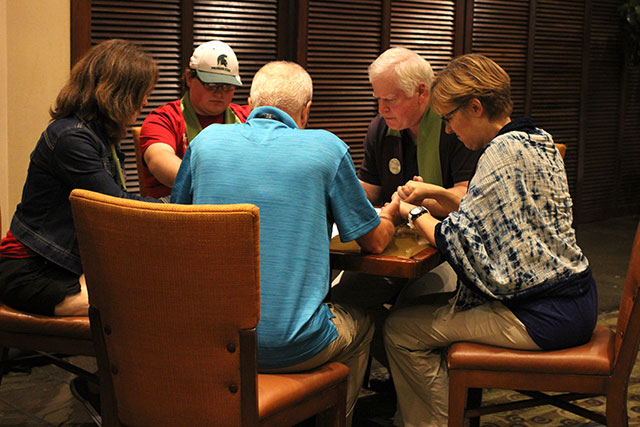 Churchgoers at the 2016 Assembly of the Evangelical Lutheran Church of America engage in a prayer vigil before the vote on the adoption of an investment screening process concerned with human rights. (Photo: Christopher Hazou)
Churchgoers at the 2016 Assembly of the Evangelical Lutheran Church of America engage in a prayer vigil before the vote on the adoption of an investment screening process concerned with human rights. (Photo: Christopher Hazou)
The ELCA’s decision to take a stance against the Israeli occupation of Palestine brings it in step with the many other mainline Protestant churches in the US that have taken up this issue. This trend stands in sharp contrast to the continued unconditional support for Israeli policies expressed among white evangelical Protestants, who constituteone of the last remaining demographic strongholds of unconditional Israeli support in the US.
Before this latest push within the ELCA (which is classified as a mainline Protestant denomination, despite the misleading “Evangelical” in its name), eight other religious denominations had already engaged in what Anna Baltzer of the US Campaign to End the Israeli Occupation has called “economic acts of conscience to support justice for Palestinians”: the Quakers, the Mennonite Central Committee, the United Methodists, the Presbyterians, the United Church of Christ, the Unitarian Universalists, the Catholic Conference of Major Superiors of Men, and the Alliance of Baptists.
Such acts of conscience carry particular weight during this election cycle, as US officials consider increasing the $3.1 billion-a-year military aid package to Israel, a nation that already receives far more US aid than any other country in the world, despite its relative wealth and abysmal human rights record.
Memorial C2 would enable the congregation to “put our money where our mouth is,” said Pastor Khader Khalilia. “It’s not just preaching the word — we have to also practice what we preach.”
Pastor Khalilia grew up Lutheran under Israeli occupation near Bethlehem in the West Bank. During debate on the Memorial, Khalilia spoke of the pervasive sense of powerlessness he felt coming of age in Palestine, living with the knowledge “that we really, deeply cannot control anything.”
He told of an hours-long gunfire attack he once weathered with his family, lying on the floor with his six-year-old brother to avoid the spray of bullets.
“Later,” he said, “we went outside the house to collect the bullet shells. The Israeli bullets were made in the United States.”
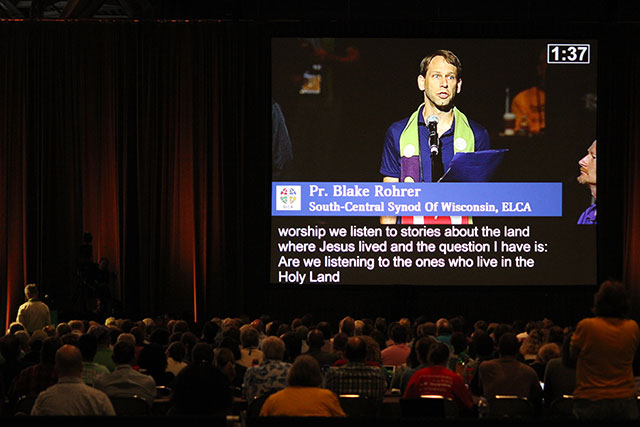 A voting delegate testifies in favor of the two initiatives that the Evangelical Lutheran Church of America to affirm Palestinian human rights. (Photo: Christopher Hazou)
A voting delegate testifies in favor of the two initiatives that the Evangelical Lutheran Church of America to affirm Palestinian human rights. (Photo: Christopher Hazou)
Hearing Khalilia’s words, I remembered my own experience in the West Bank a few months earlier — dodging a barrage of tear gas canisters fired at the small group I’d come with to Nabi Saleh, a village near Ramallah. The heavily armed Israeli soldiers dispersed our nonviolent demonstration in short order, but I remember plucking an empty tear gas canister from the street. It was still hot. On the underside, stamped into the metal cartridge, was the name of a manufacturing company in Pennsylvania.
Many of the organizers with Isaiah 58 cite similar experiences as cause for their involvement.
“I feel really passionate about seeing the face of Christ in people who are facing occupation and listening to what they have to say,” said Pastor Dustin Wright, a 30-year-old with both sleeves of his plaid shirt rolled up. With fast fingers perpetually hash-tagging on the keyboard of his laptop, Wright spoke to me about the Kairos Palestine Document. The letter, penned in 2009 by a coalition of Palestinian Christians, calls on “the international community to stand by the Palestinian people who have faced oppression, displacement, suffering and clear apartheid for more than six decades.” It is undersigned by more than a dozen Christian leaders of various denominations.
“We felt like it was time to take action,” said Wacker-Farrand. “Who can be against human rights? What we believe about diversity, what we believe about justice — should that not be put across the board for all of humanity?”
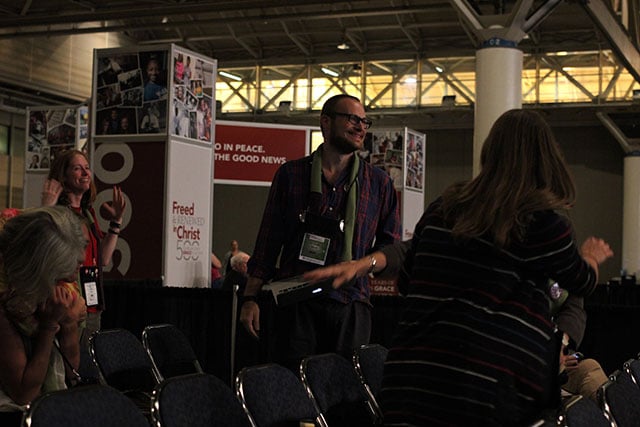 Pastor Dustin Wright reacts with joy after Memorial C2 passes by a landslide vote. (Photo: Christopher Hazou)
Pastor Dustin Wright reacts with joy after Memorial C2 passes by a landslide vote. (Photo: Christopher Hazou)
Ellie Sudbrock, a white-haired delegate from New York, stepped forward to microphone 9 to call the Memorial up to a vote. Next, Bishop Elizabeth Eaton, the assembly chair — her voice amplified, her face blown up to seven times its size on a megatron screen set up behind her onstage — asked for a second to the motion. Voices called out in approval. There had been some technical difficulties with the electronic vote counters, so the vote would be made by raising either one of two rectangular sheets of paper — green for yes, red for no.
It became very quiet inside the vast hall.
“Debate is closed,” said Bishop Eaton. “We are ready to vote on the Memorial before us.”
Wacker-Farrand made another pass before my seat, chanting under her breath, “I can’t sit down, I can’t sit down.” Behind me, 22-year-old Kathryn Kester of North Dakota stood stock still and tense, her hands over her mouth. If the Memorial failed to garner a majority vote, Isaiah 58 would have to settle either for a Church Council ruling on the measure, or wait a full three years before the next assembly.
Gazing out over the crowd of delegates on the floor, I felt another kick of the skepticism that I’d come to the convention with. Despite the number of buttons and green-and-purple fleece stoles Isaiah 58 had passed out to delegates that week — despite, in fact, the great number of them that I’d seen on the shoulders and name tags of those now preparing to vote — I was apprehensive about the outcome. Was this church willing to weather the backlash to come, the same backlash that flared up in response to another mainline Protestant denomination’s similar act of economic conscience?
In that moment, I doubted it. But now as I write, I’m thinking of Sudbrock, who told me later that she was “old enough to remember the ’60s, and civil rights. And people saying — oh, you’re going too fast, there will backlash.”
“But when something you believe is spirit-led,” she said. “Then no matter what the risk, we do it.”
I can’t say for sure what led nearly every one of those Lutheran delegates in the convention center to reach for their green cards that morning. I’m a lapsed Catholic; as such, I don’t feel confident reporting on matters of the spirit. But I watched as the voting cards went up and, in an unfurling forest full of strange, kelly-green paper leaves, the Evangelical Lutheran Church of America voted ‘yes.’
Join us in defending the truth before it’s too late
The future of independent journalism is uncertain, and the consequences of losing it are too grave to ignore. To ensure Truthout remains safe, strong, and free, we need to raise $33,000 in the next 2 days. Every dollar raised goes directly toward the costs of producing news you can trust.
Please give what you can — because by supporting us with a tax-deductible donation, you’re not just preserving a source of news, you’re helping to safeguard what’s left of our democracy.